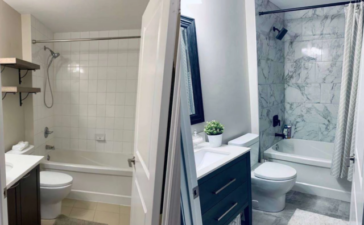When it comes to plumbing, the bathroom is the most complex room in the home. That should not come as too big of a surprise when you consider how many fixtures in the bathroom use water; the bath and shower, sink, and the toilet all use water. Plus there are the hot and cold water lines for both the sink and shower to consider.
All those pipes and water lines mean that there is always a risk that something can go wrong, like a clog or a leak. However, there are things that you can do that will minimize the chance of a problem occurring and keep your bathroom in tip-top shape. If something does go wrong and you cannot take care of it yourself, then call Leading Edge Plumbing & Rooter if you live in California.
The Toilet Is Not a Garbage Disposal
If you don’t want your toilet backing up, then only use it for what it was intended. Do not flush disposable items down the toilet because they could easily clog up the pipes to the point where a plunger won’t be able to get rid of the blockage. Some items like tampons or disposable diapers may claim to be flush-safe but they can end up causing a clog. It is better if you dispose of those items in the garbage and leave the toilet to be used as it was intended.
Update Your Pipes (If Necessary)
If your home was built before 1970, then your pipes are almost certainly out of date and need to be replaced as soon as possible. Older pipes are usually made from iron, steel, lead, or polybutylene, all of which can suffer from rust and corrosion, which can lead to a breakage. Also, anyone who pays attention to the news in the past few years must realize that the lead can leech from the pipes and poison the water supply. To keep your pipes intact and your water supply safe, replace any old and outdated pipes with modern copper, plastic, or PVC pipes.
Protect The Drains
The drains in the sink and the shower need to be protected because they are very susceptible to blockages. Stray hairs and soap scum can clog up the shower drains while various objects can fall into the sink drain. You can prevent either of those scenarios from happening by using tub strainers and drain covers to prevent them from getting blocked. You should clean the covers and strainers on a regular basis otherwise you might end up with a slow drain.
Do Not Use Chemical Drain Cleaners
It might be tempting to reach for a bottle of drain cleaner whenever the sink or shower drain is blocked or running slowly, but that might not be the best solution. Not only might the drain cleaner not work, it may actually cause a different problem because those chemical drain cleaners can be highly corrosive. Instead of using a chemical drain cleaner, you can opt for an organic one instead.
You can also try searching online for the recipe for a homemade drain cleaner that uses easily attainable, everyday ingredients. You can also use a plumbing snake to unclog the drain. If none of those options work, then you should call a plumber instead of reaching for that bottle of chemical drain cleaner.
Keep The Water Flowing
Showerheads and aerators are susceptible to the buildup of deposits, like lime and sediment, that can slow the flow of water. You can solve that problem by removing them and soaking them in vinegar overnight. That will clear out the deposit buildup and have the water flowing freely again. If the aerator cannot be removed, then you can use a brush soaked in vinegar to scrub away any sediment buildup.
Schedule Regular Plumbing Maintenance
Routine maintenance is a great way to prevent many plumbing problems from happening in the first place. If you schedule a professional drain cleaning every few months, it can help to get rid of any clogs and prevent the pipes from decaying. A professional can also spot any potential defects or cracks that can become a big problem later on. If there are any parts that need replacing, then a professional will find them and offer you recommendations.
Use These Tips To Keep Your Plumbing System In Top Shape
These tips will keep your water system working perfectly and lower the chance that something could go wrong. Most of these tips are all pretty easy to do even for anyone with no plumbing experience whatsoever, for the rest a professional can do the job for you. Make sure that you call a certified plumbing professional to help you with the more complex jobs that you cannot handle yourself.







